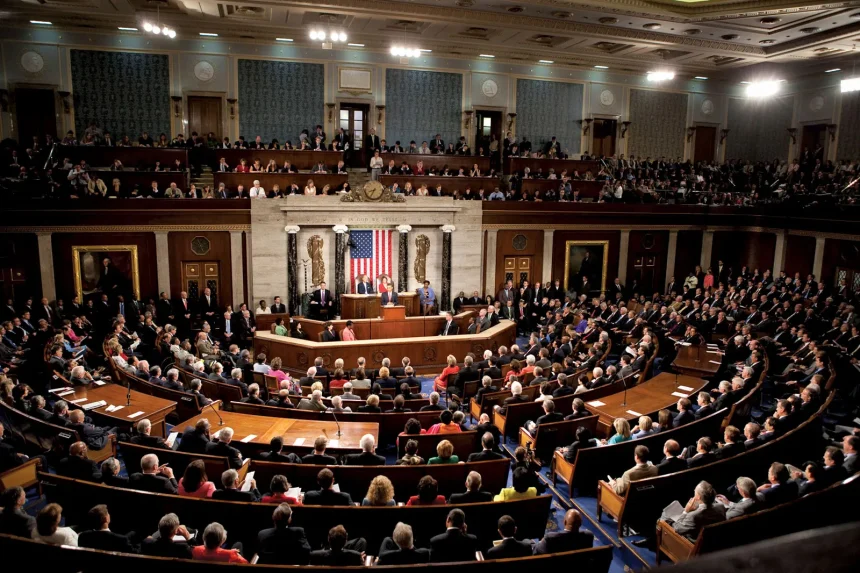The United States House of Representatives, under Republican control, has approved a controversial $9 billion funding cut to public media and foreign aid, marking a major fiscal move backed by President Donald Trump.
The bill, passed in the early hours of Friday with a narrow 216 to 213 vote, now heads to the White House for presidential assent.
Only two Republican Representatives, Brian Fitzpatrick of Pennsylvania and Mike Turner of Ohio, voted against the measure alongside Democrats.
Although the funding clawback initially included cuts to the global PEPFAR HIV/AIDS prevention programme, the Senate amended the bill earlier this week to spare approximately $400 million designated for the initiative.
Speaking in support of the measure, Representative Aaron Bean of Florida described the move as “one small step to cut wasteful spending, but one giant leap towards fiscal sanity,” urging the White House to push similar packages monthly.
However, Democratic opposition was swift and sharp. House Minority Leader Hakeem Jeffries warned that the media funding cut would compromise national safety and erode America’s global influence through reduced soft power.
He also highlighted the potential impact on rural communities, particularly regarding access to critical public radio broadcasts during emergencies.
The vote was delayed for hours due to intra-party disputes among Republicans, particularly over unrelated demands for greater transparency regarding documents linked to Jeffrey Epstein, the late disgraced financier. In response, the House Rules Committee introduced a resolution calling on the U.S. attorney general to release the Epstein files within 30 days, though critics noted the resolution lacks enforcement mechanisms.
Representative Jim McGovern, the top Democrat on the Rules Committee, described the resolution as a “glorified press release,” questioning its effectiveness without legal weight to compel action.
Friday’s vote marked the second time the House has narrowly supported Trump’s push to rescind previously approved funds. An earlier version passed by just two votes—214 to 212—in June, with four Republicans joining Democrats in opposition. The urgency to act arose from a deadline requiring Congress to approve the cuts by Friday to prevent the executive branch from being forced to spend the funds.
The $9 billion reduction represents a small fraction, approximately one-tenth of one per cent of the $6.8 trillion federal budget. Republicans argue the affected foreign aid programs are wasteful, while also accusing public media, including PBS and NPR, of anti-conservative bias.
In a pre-dawn vote on Thursday, the Senate passed the measure 51 to 48. Only two Republicans, Senators Susan Collins of Maine and Lisa Murkowski of Alask,a voted against it, raising constitutional concerns about the legislative branch ceding its power of the purse to the executive.
“There’s a good reason we haven’t seen a successful rescissions package pass the Senate in 33 years,” Murkowski stated. “It’s because we recognise that’s our role here.”
While spending cuts are typically agreed upon through bipartisan negotiations in the annual appropriations process, this unilateral move sparked fears among Democratic leaders that it could poison the collaborative atmosphere necessary to pass future government funding legislation. Unlike standard budget bills that require 60 votes in the Senate, rescission packages only need a simple majority.
Following the vote, the Trump administration signalled its intent to send additional funding cut requests to Congress. According to Democratic lawmakers, the administration has withheld more than $425 billion in congressionally approved funds since the start of Trump’s second term in January.
Russ Vought, Director of the Office of Management and Budget, suggested more cuts were imminent. His comment during a Christian Science Monitor breakfast that “the appropriations process has to be less bipartisan” drew swift condemnation from senators across party lines.
Senator Collins, who chairs the Senate Appropriations Committee, responded firmly: “The best way for us to counter what has been said by the OMB director is to continue to work in a bipartisan way.”
ALSO READ TOP STORIES FROM NIGERIAN TRIBUNE
WATCH TOP VIDEOS FROM NIGERIAN TRIBUNE TV
- Let’s Talk About SELF-AWARENESS
- Is Your Confidence Mistaken for Pride? Let’s talk about it
- Is Etiquette About Perfection…Or Just Not Being Rude?
- Top Psychologist Reveal 3 Signs You’re Struggling With Imposter Syndrome
- Do You Pick Up Work-Related Calls at Midnight or Never? Let’s Talk About Boundaries







